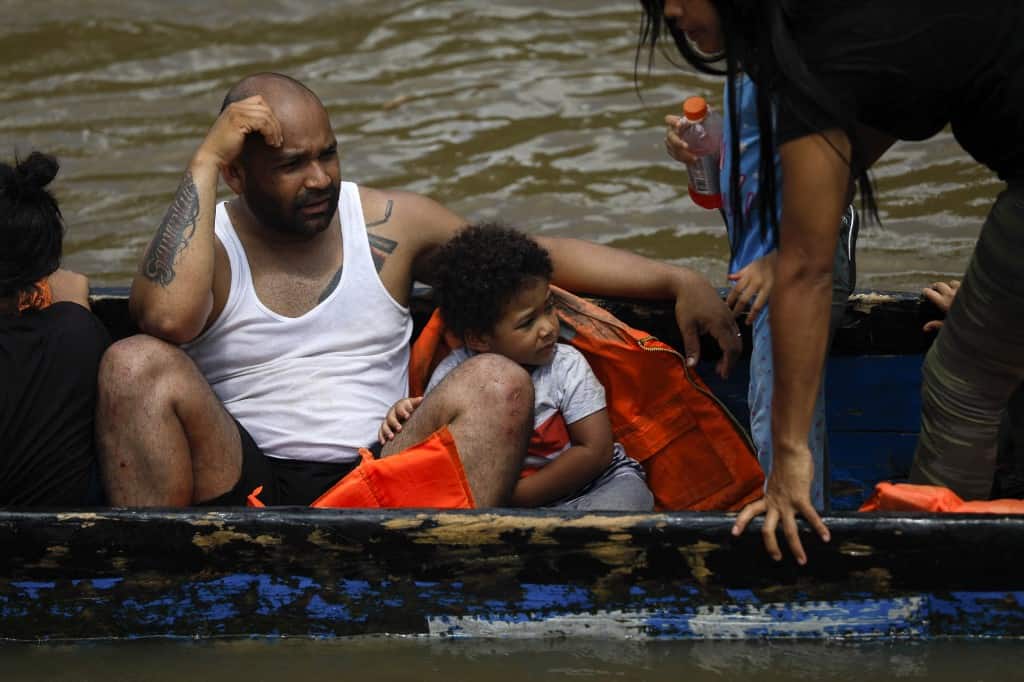With his young son on his shoulders, Dennis Font has just crossed the dangerous Panamanian jungle of the Darién. No warning of repatriation to Venezuela will stop him from reaching the United States: “Nothing ventured, nothing gained,” he says confidently.
Dennis, 32, is traveling with two other children and his wife. He left Venezuela, where he was a bricklayer, because “the situation is screwed up,” he says in Lajas Blancas, 250 km east of Panama City, almost five hours by road with battered sections, on the border with Colombia.
There, at a migrant reception camp, he has just found out, like many of his compatriots who spent four days crossing the Darién, that the United States has agreed with the government of Nicolás Maduro on the “direct repatriation” of Venezuelans migrating illegally.
Deportation will begin “quickly,” said a U.S. official who requested anonymity. “They should try to help us instead, to support us, I’m going to the United States to work, to get my family ahead,” Dennis lamented.
The fear of deportation is not greater than that longing, for many at the Temporary Migrant Reception Center in Lajas Blancas, where international organizations help Panamanian institutions care for migrants.
“It worries me, although I would prefer a thousand times to stay in other countries than (return) because Venezuela is torture, you die alive, I see no future there,” says Daniel Rosales, 27.
In the migrant reception center the roads are dirt. They sleep in wooden barracks, on mattresses on the floor, among the clothes hanging out to dry. Outside there are communal bathrooms next to a small laundry area and several improvised showers.
To this center, visited Friday by the presidents Rodrigo Chaves (Costa Rica) and Laurentino Cortizo (Panama), migrants arrive in organized canoe trips, after being detected by Panamanian authorities.
The leaders of the two neighboring countries, who met to address the migration crisis, saw how migrants arrived by canoe. Chaves advocated for a “clear policy” from the United States and that the “sending” and “transit” countries agree “to ensure that people” arriving do so “legally, orderly and humanely.”
Likewise, Cortizo called for an agreement between countries to “avoid the inhumane via crucis” through the Darién. “Let’s not wait for them to reach the border with Texas, let’s do it before,” he stressed.
Going backwards is tough
At the door of a barracks, while combing one of her two daughters with whom she travels, the Venezuelan Scarlett Ibarra, 32, clings “to God.”
She has crossed the Darién with about twenty relatives. “After making this journey where you see so many dead I would not like to be deported,” she confesses.
The Darién jungle, covering 575,000 hectares, is one of the most dangerous corridors for migrants who, from South America, try to reach the United States by traveling through Central America and Mexico.
According to Panama’s Migration Department, as of October 6, more than 417,000 people, a fifth of them minors, had crossed the Darién in 2023. That figure shatters last year’s record, when there were 248,000.
The majority are Venezuelans (more than 265,000), Ecuadorians (48,000) and Haitians (more than 38,000), although there are also Asians and Africans.
Many die on this path of raging rivers, plagued with wild animals and fall victim to criminal gangs that extort them. When migrants cross the jungle they are taken to different centers where they receive medical attention and basic services.
Daniel says he would cross the Darién again, but only by himself. “I wouldn’t risk my daughter on that road again,” he said. Some corpses remain on the route and are devoured by animals.
Nixon Espino, a 19-year-old barber, a native of Maracaibo (northwest Venezuela), is traveling with siblings. “We have to go there and see what happens because going back is tough,” says Nixon, hopeful of reaching the United States, working and sending money for a child who will soon be born in Venezuela.






